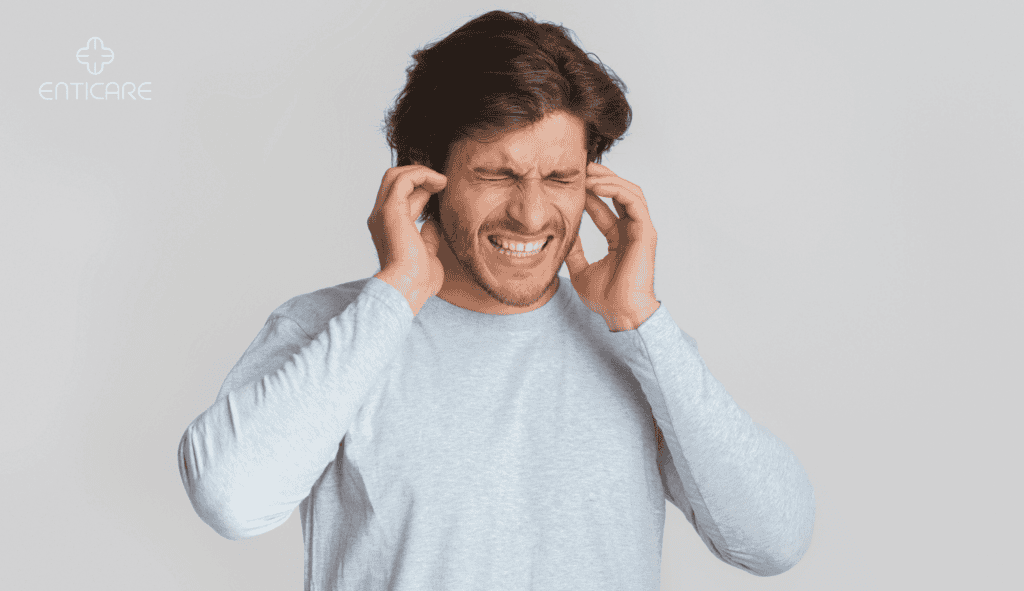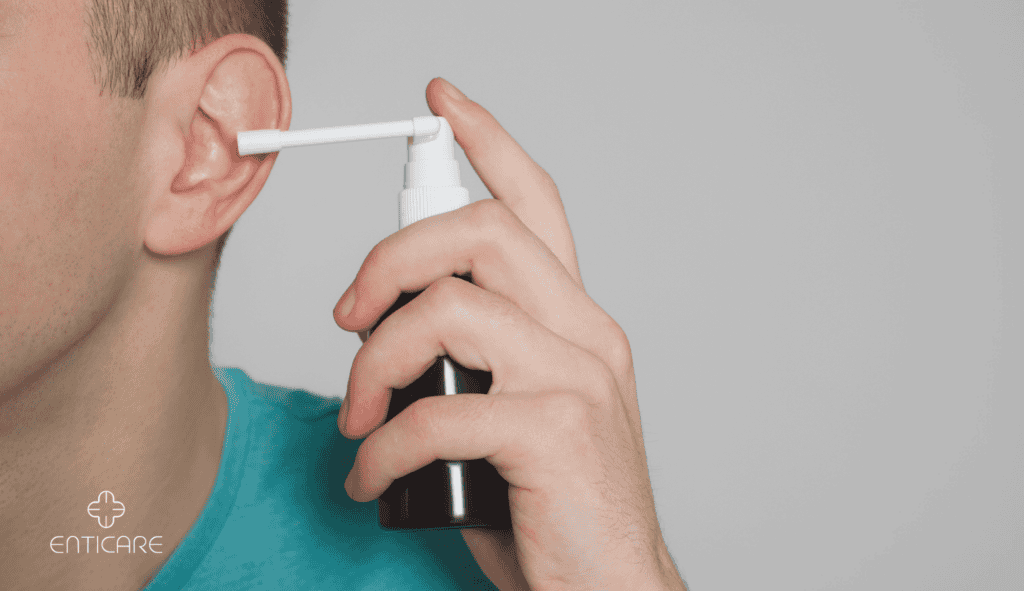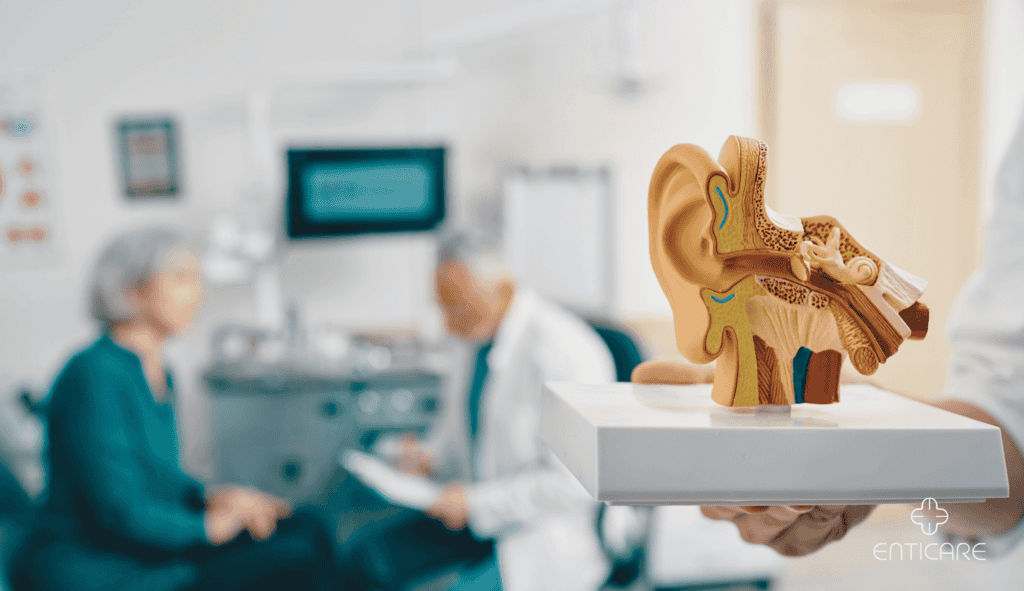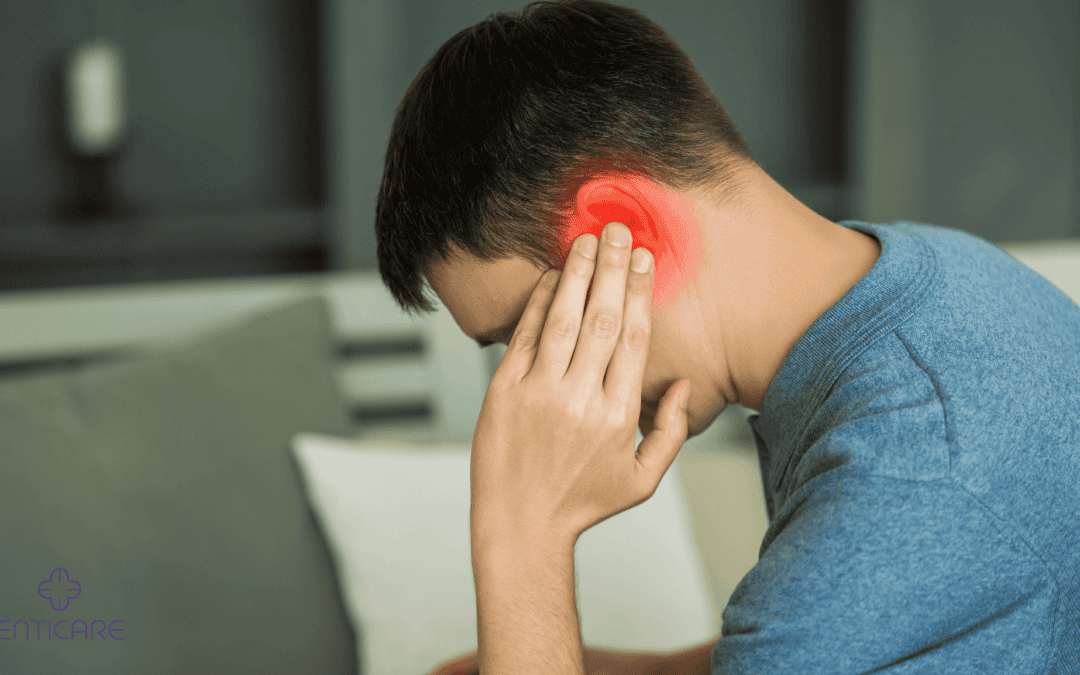What Is Tinnitus?
Tinnitus refers to the sensation of hearing sounds when no external noise exists. These sounds can vary from ringing to buzzing, humming, or even hissing. An ear infection can be a potential cause of tinnitus.
Types of Tinnitus, Including Pulsatile Tinnitus
- Subjective Tinnitus: Only you can hear this type, caused by issues in the auditory system.
- Objective Tinnitus: A rare form that a doctor can detect during an exam, often linked to physical noise in the body, like blood flow.
- Pulsatile Tinnitus: Characterized by a rhythmic pulsing sound that may coincide with the heartbeat. This type can indicate an underlying condition and may require medical attention if persistent.

How Tinnitus Impacts Daily Life
Persistent tinnitus, often experienced as ears ringing, affects focus, sleep, and overall mood. It can make quiet moments feel overwhelming and disrupt daily activities.
Inner Ear and Tinnitus
The inner ear is a marvel of biological engineering, playing a pivotal role in our ability to hear and maintain balance. This intricate structure converts sound waves into electrical signals our brain can interpret. The inner ear comprises the cochlea, vestibule, and semicircular canals. While the cochlea is dedicated to processing sound, the vestibule, and semicircular canals are essential for balance and equilibrium.
Tinnitus often stems from damage to the inner ear, particularly the cochlea. When the delicate hair cells within the cochlea are harmed, they can send erroneous signals to the brain, creating the illusion of sound where none exists. This miscommunication can manifest as ringing, buzzing, or other phantom noises in the ears.
Certain inner ear disorders, such as Meniere’s or otosclerosis, can also lead to tinnitus. These conditions disrupt the normal functioning of the inner ear, affecting both balance and hearing and often result in persistent tinnitus symptoms.
Causes of Tinnitus
Exposure to Loud Noises
Loud music, construction equipment, or prolonged use of headphones can damage the tiny hair cells in your inner ear, leading to tinnitus.
Earwax Blockages
Excess earwax can block your ear canal, causing pressure changes, ear pain, and ringing sounds. Cleaning the blockage often alleviates these symptoms.
Medical Conditions Linked to Tinnitus and Hearing Loss
- Hearing Loss: Aging can reduce your ability to hear specific frequencies, causing the brain to compensate with tinnitus.
- Meniere’s Disease: This inner ear disorder can trigger ringing, dizziness, and hearing loss.
- Hypertension: High blood pressure or conditions affecting blood flow may result in pulsating tinnitus.
- Neck Surgery: Tinnitus caused by head or neck injuries may be treated with neck surgery.
Learn more about tinnitus causes here.
How to Recognize Tinnitus
Common Sounds People Hear
People with tinnitus report hearing sounds in one or both ears:
- High-pitched ringing or buzzing
- Low-frequency humming
- Clicking or pulsating sounds
Signs It Might Be Temporary
Tinnitus may subside when caused by loud noise exposure or temporary ear infections.
Indicators of Chronic Tinnitus
Chronic tinnitus lasts for months or longer and often signals underlying health issues. Seek medical attention if the ringing persists.
Tinnitus in the Morning
Waking up to the unwelcome tinnitus sound can be a daunting way to start the day. Morning tinnitus can be triggered by various factors, including earwax buildup, ear infections, or allergies. Sometimes, it may signal an underlying condition like age-related hearing loss or an inner ear disorder.
Managing morning tinnitus involves several strategies. Sound therapy, for instance, uses external noises like white or natural sounds to mask the tinnitus and provide relief. Cognitive-behavioral therapy (CBT) can help reframe negative thoughts about tinnitus and develop effective coping mechanisms. Additionally, relaxation techniques such as deep breathing or meditation can alleviate stress and anxiety, which often exacerbate tinnitus symptoms.

Effective Relief for Tinnitus
Home Remedies and Lifestyle Adjustments
- Limit caffeine and alcohol, which can worsen tinnitus.
- Manage stress through mindfulness or yoga, as anxiety amplifies tinnitus.
- Avoid prolonged exposure to loud sounds.
Medical Treatments and Therapies
Doctors may recommend:
- Medication: Treating underlying conditions like hypertension.
- Sound Therapy: Masking tinnitus with soothing background sounds.
- Hearing Aids: Amplifying external sounds to reduce the perception of tinnitus.
- Hearing Test: Diagnosing tinnitus and other hearing issues to determine the appropriate treatment.
Cognitive-Behavioral Therapy
Cognitive-behavioral therapy (CBT) is a powerful tool against tinnitus. This form of psychotherapy focuses on identifying and altering negative thought patterns and behaviors that contribute to tinnitus distress. Techniques such as deep breathing, progressive muscle relaxation, and mindfulness are integral to CBT, helping individuals manage their tinnitus symptoms more effectively.
CBT is particularly beneficial for those who experience anxiety or depression related to their tinnitus. By addressing these underlying emotional conditions, CBT fosters a more positive outlook and significantly enhances overall quality of life.
Advanced Hearing Solutions, Including Hearing Aids
Specialized devices and therapies, such as tinnitus retraining therapy (TRT), help train the brain to ignore ringing sounds. Explore effective tinnitus treatments here.

When to Consult an ENT Specialist
Signs You Shouldn’t Ignore
Visit a specialist if you experience:
- Persistent tinnitus for more than a week
- Sudden hearing loss or dizziness
- Severe ringing that disrupts daily life
How Specialists Diagnose Tinnitus
Doctors use hearing tests, physical exams, and imaging to determine the root cause of tinnitus and develop a personalized treatment plan. Head and neck injuries can alter how the brain processes sound, leading to tinnitus.
Why Early Treatment Matters
Prompt care improves outcomes, prevents complications, and helps restore your quality of life.
Getting Support
Living with tinnitus can be isolating, but you don’t have to navigate it alone. Support groups, whether online or in-person, offer a sense of community and connection with others who understand your experience. Online forums and social media groups provide platforms for sharing advice and personal stories, creating a supportive network.
Organizations like the American Tinnitus Association and the National Institute on Deafness and Other Communication Disorders (NIDCD) offer extensive information on tinnitus causes, symptoms, and treatments. These resources can be invaluable in understanding and managing your condition.
Professional support is equally important. Audiologists and ear, nose, and throat (ENT) specialists can provide accurate diagnoses and tailored treatment plans. They can guide you through options like hearing aids, sound therapy, and other effective treatments, helping you regain control over your tinnitus symptoms.
Quiet the Noise for Good
You don’t have to live with the constant ringing in your ears. Take the first step toward relief today. Schedule an appointment with our hearing specialists and rediscover the joy of precise, quiet moments.

